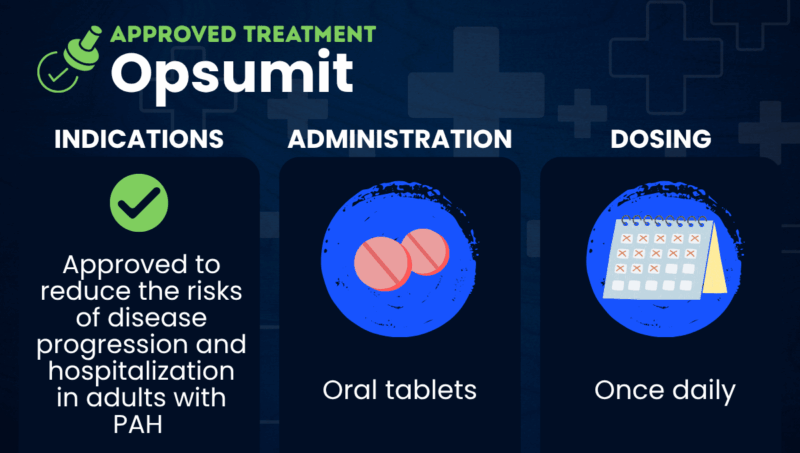Opsumit (macitentan) for pulmonary arterial hypertension
What is Opsumit for pulmonary arterial hypertension?
Opsumit (macitentan) is an oral medication approved to reduce the risk of disease progression and hospitalization in adults with pulmonary arterial hypertension (PAH).
In PAH, the pulmonary arteries carrying blood from the heart to the lungs are narrowed, increasing blood pressure and impeding blood flow. This limits the amount of oxygen that enters the bloodstream, making physical activity increasingly difficult. The right side of the heart also becomes strained, which can eventually lead to complications and more frequent hospital stays.
Opsumit belongs to a class of PAH therapies called endothelin receptor antagonists. It works by blocking the activity of endothelin, a protein that causes blood vessels to narrow and which is overactive in PAH. In doing so, Opsumit helps the blood vessels in the lungs widen, thereby relieving the abnormally high blood pressure and easing PAH symptoms.
Taken as tablets, Opsumit was developed by Actelion Pharmaceuticals, now part of Johnson & Johnson, with generic versions also available. The company also markets a fixed dose combination therapy for PAH — sold in the U.S. as Opsynvi — that contains macitentan, the active ingredient in Opsumit, and tadalafil, the active ingredient in Adcirca.
Therapy snapshot
| Brand name | Opsumit |
| Chemical name | Macitentan |
| Usage | Used to reduce the risks of disease progression and hospitalization in adults with PAH |
| Administration | Oral tablets |
Who can take Opsumit?
Opsumit is approved in the U.S. to reduce the risk of disease progression and hospitalization in adults with PAH (World Health Organization, or WHO Group 1).
The medication is also approved in other areas, although specific indications vary. In the European Union, it is approved for use in people 2 years and older with PAH that causes moderate or marked limitations in physical activity (corresponding to WHO Functional Class II or III, respectively), either alone or in combination with other medications.
Opsumit is contraindicated, or should not be used, in patients who:
- are pregnant
- have a history of hypersensitivity (severe allergic reaction) to macitentan or any of the ingredients in Opsumit.
The medication comes with a boxed warning that it may cause fetal harm if used during pregnancy, so pregnancy must be ruled out before starting treatment.
How is Opsumit administered?
Opsumit is available as film-coated oral tablets to be taken by mouth once daily, with or without food. The recommended dose is 10 mg once daily. Doses higher than 10 mg have not been studied in people with PAH and are not recommended.

Opsumit in clinical trials
The approval of Opsumit for PAH in the U.S. was supported by data from SERAPHIN (NCT00660179), a large Phase 3 clinical trial that involved people with PAH, 12 years and older, who were randomly assigned to receive one of two doses of Opsumit or a placebo once daily. Data showed:
- When used at its approved dose, Opsumit lowered the risk of death or other clinical worsening events by 45% compared with a placebo over a median treatment time of about two years. Improvements in exercise capacity and measures of blood flow were also observed with Opsumit.
- The benefits of Opsumit were consistent regardless of age, sex, race, PAH cause, or use of other PAH treatments.
SERAPHIN was followed by an open-label extension study called SERAPHIN OL (NCT00667823), where all participants continued to receive Opsumit. Long-term data showed the estimated survival rates were 95% after one year on Opsumit, 84% after three years, 73.3% after five years, and 62.6% after seven years. It was estimated that more than half of the patients would still be alive after nine years of treatment.
Opsumit side effects
The most common side effects reported with Opsumit include:
- low red blood cell counts (anemia)
- the common cold (nasopharyngitis) and sore throat (pharyngitis)
- airway inflammation (bronchitis)
- headache
- influenza (the flu)
- urinary tract infection.
Animal data indicate Opsumit may cause fetal harm. As such, pregnancy must be ruled out before treatment starts, and effective methods of contraception should be used before, during, and for at least one month after stopping treatment. If pregnancy occurs, patients should immediately tell a healthcare provider, as Opsumit should be discontinued as soon as possible.
Opsumit may also be associated with other less common but serious adverse events, including:
- liver toxicity
- swelling and fluid retention
- reduced sperm count.
If fluid buildup in the lungs occurs, patients should be evaluated for pulmonary veno-occlusive disease, a rare cause of PAH. If that condition is confirmed, Opsumit should be discontinued.
Pulmonary Hypertension News is strictly a news and information website about the disease. It does not provide medical advice, diagnosis, or treatment. This content is not intended to be a substitute for professional medical advice, diagnosis, or treatment. Always seek the advice of your physician or other qualified health provider with any questions you may have regarding a medical condition. Never disregard professional medical advice or delay in seeking it because of something you have read on this website.
 Fact-checked by
Fact-checked by 


